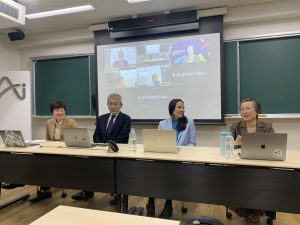2024.Mar.12
REPORTSReport on the B’AI Global Forum Lecture “Language Education in the AI Era”
Kayoung Kim (Project Researcher of the B’AI Global Forum)
・Date: Monday, January 15, 2024, 3:30~5:00 pm (JST)
・Venue: Hybrid (Zoom Webinar & 327, Faculty of Science Bldg.3, The University of Tokyo)
・Language: Japanese
・Organizer: B’AI Global Forum, Institute for AI and Beyond, The University of Tokyo
・Supported by The Institute for AI and Beyond, The University of Tokyo
(Click here for details on the event)

On January 15, 2024, the lecture titled “Language Education in the AI Era,” organized by the B’AI Global Forum and supported by the Institute for AI and Beyond at the University of Tokyo, was held. Yujin Yaguchi, Vice President and Director of the Center for Global Education at the University of Tokyo, who has been involved in English education at the university for a long time, Sho Tsuji, Lecturer at the International Research Center for Neurointelligence at the University of Tokyo, who examines the language development of infants and toddlers from a neuropsychological perspective, and Takane Ito, Vice President of the University of Tokyo, with extensive experience in English education at the university, delivered lectures and discussed the impact of generative AI on language acquisition and the approach to language education in the AI era.
First, Kaori Hayashi, Executive Vice President at the University of Tokyo, delivered the opening remarks. Hayashi emphasized that language acquisition is not just about improving practical skills but expanding knowledge and opening doors to unknown worlds. She further highlighted the importance, amidst the changing landscape of language acquisition due to AI, of reconsidering through the lends of AI what language acquisition truly entails.
Next, Yujin Yaguchi delivered a lecture titled “University Language Education and Generative AI.” Yaguchi, who visited the headquarters of Duolingo, a language learning app based on large language models (LLM), suggested that if technology is changing the traditional model and content of education, universities should reconsider their approach to language education incorporating AI from scratch. This proposal stemmed from self-reflection and criticism regarding the status quo of the University of Tokyo’s language education to focus on a few majority languages, such as English, and emphasize grammar comprehension and reading in Japanese. However, it was pointed out that while the benefits of AI utilization were acknowledged, there is a need to thoroughly consider what AI cannot provide in language education and how university realize them. According to Yaguchi, in language education, it is crucial to enhance the ability to express opinions clearly, understand others through dialogue, and cultivate empathy, which are essential aspects achievable through human education.
Then, Sho Tsuji gave a lecture titled “Relationship Between Language Education and Generative AI from the Perspective of Language Development.” In this lecture, she provided hints for utilizing generative AI in language education, which were acknowledged from the differences in language acquisition environments between infants and adults. According to her, the characteristics of infant language acquisition include a high motivation for language acquisition due to its direct connection to survival through communication, adjustment of difficulty levels by conversation partners, and the highly immersive learning environments, with learning being conducted implicitly. While the learning environment during infancy differs significantly from that of adults learning a second language, the potential of AI-assisted language learning was seen in that it can realize the characteristics of infant learning environments through dialogue agents. However, it was cautioned that there are limitations, such as the lack of connection to the real world and values, as well as the potential for bias derived from data.
Finally, Takane Ito delivered a lecture titled “The Significance of Engaging with ‘Different Knowledge Systems.'” Today, with the introduction of automatic translation AI and language learning AI, the debate over the necessity of foreign language education and foreign language teachers has arisen. However, according to Ito, one of the most important aspects of foreign language learning is encountering “others,” which involves experiencing languages with systems different from one’s mother tongue. By encountering systems of knowledge different from one’s own, one can understand others and relativize oneself. Ito presented analysis cases regarding two languages with different writing systems (Japanese and English), explaining how encountering different systems can deepen understanding of one’s own system as well as help one to discover universal properties between seemingly different systems.
In the general discussion after the lectures, various questions were raised, such as the possibility of further exacerbating real-world inequalities and disparities due to resource allocation driven by commercial activities like Duolingo, methods for imparting implicit characteristics in foreign language education at universities, and whether universities should prioritize language education as systems of knowledge or as tools for communication in the AI era. The lecture provided a thought-provoking platform to consider the significance of learning languages and how universities can realize this significance amidst the notable changes in language learning environments and learner motivations brought about by AI advancements.